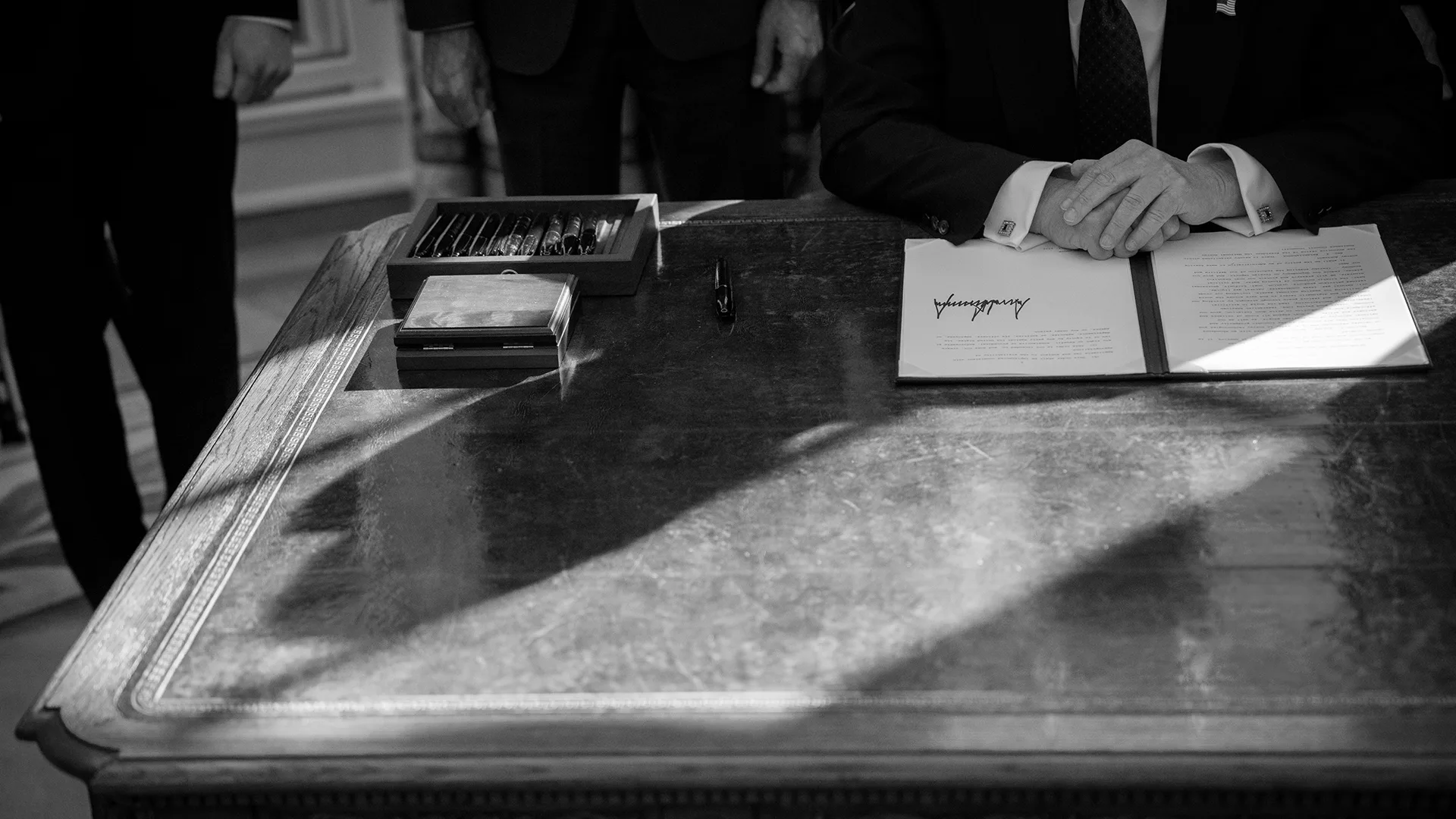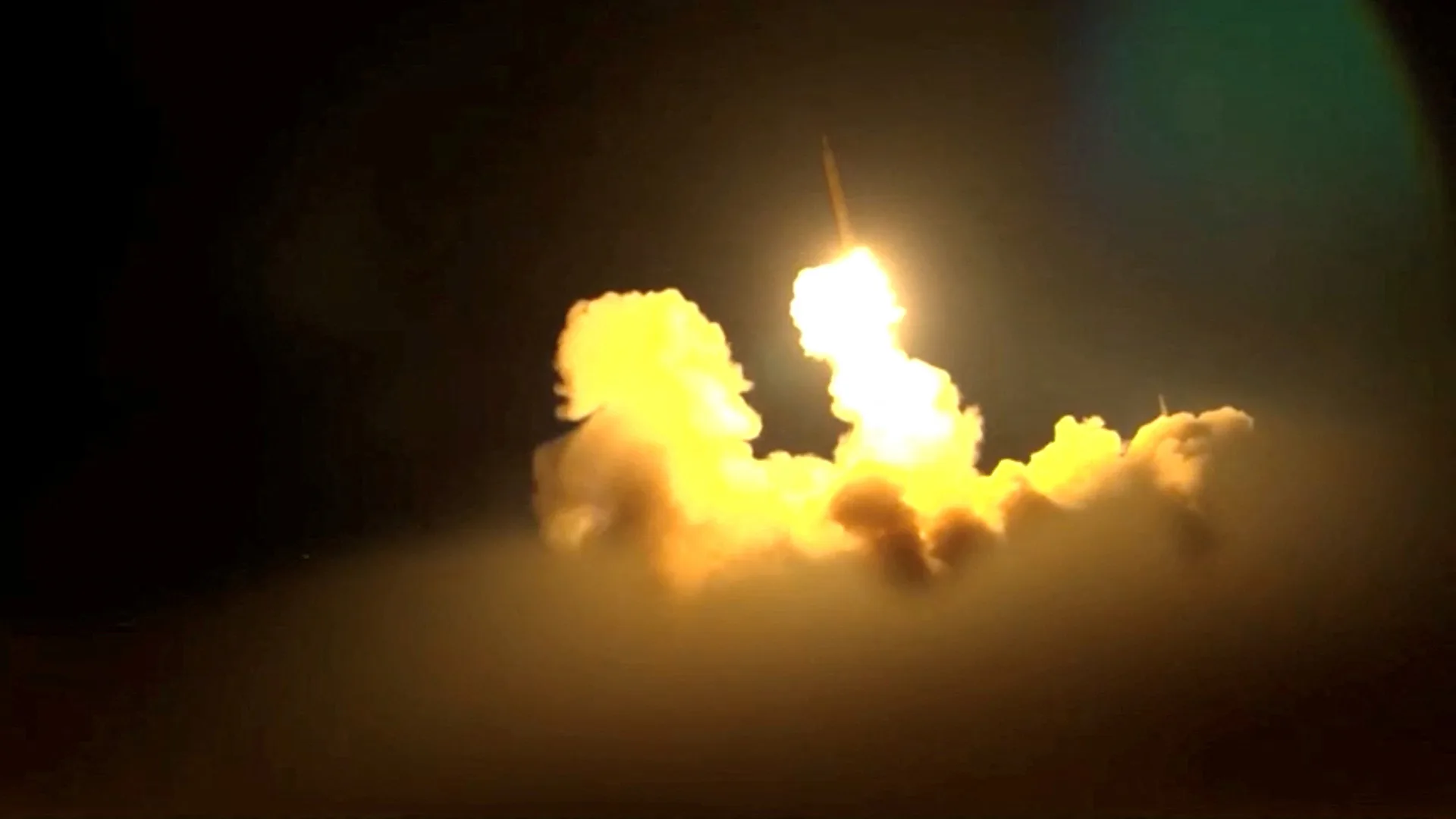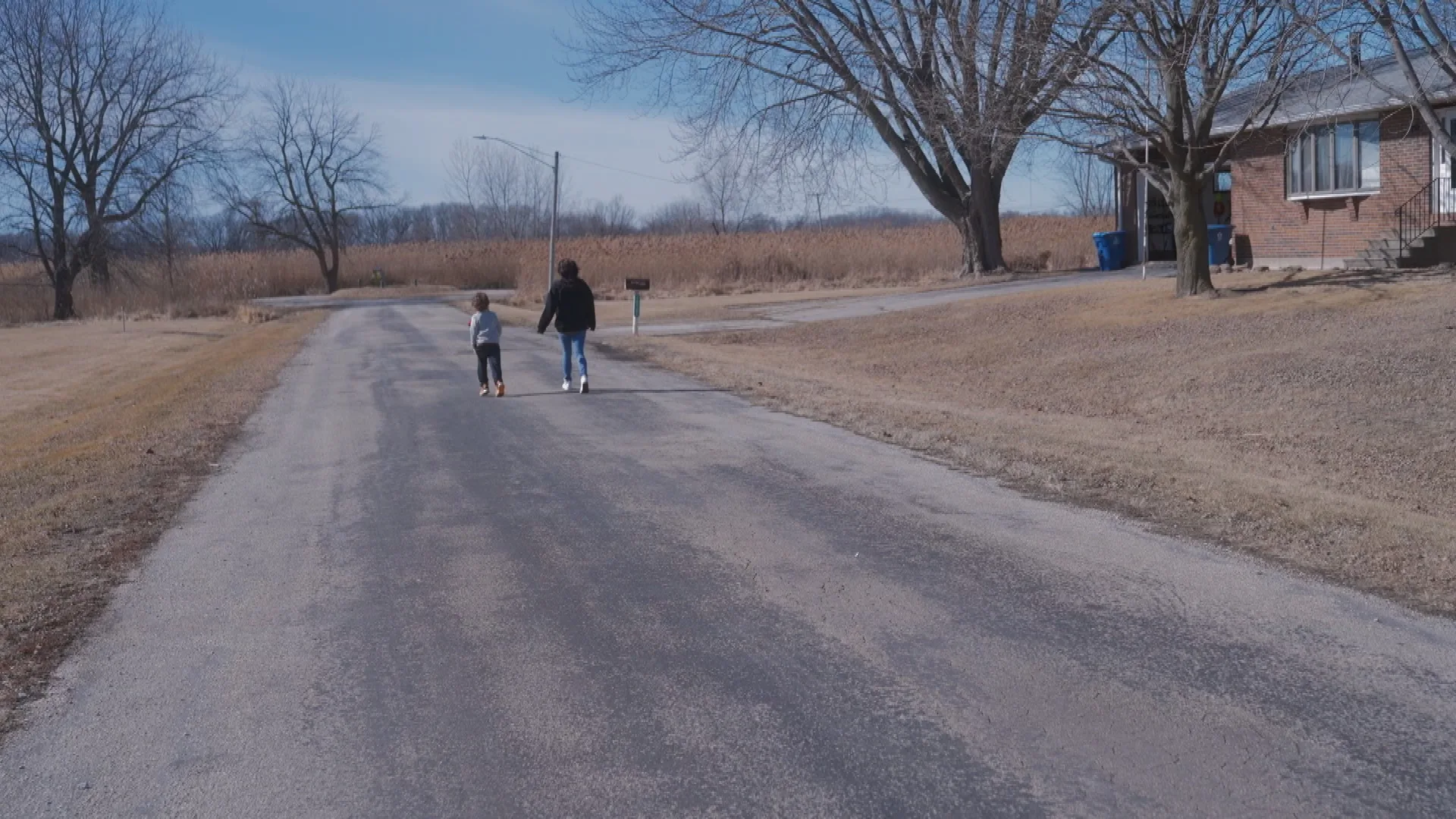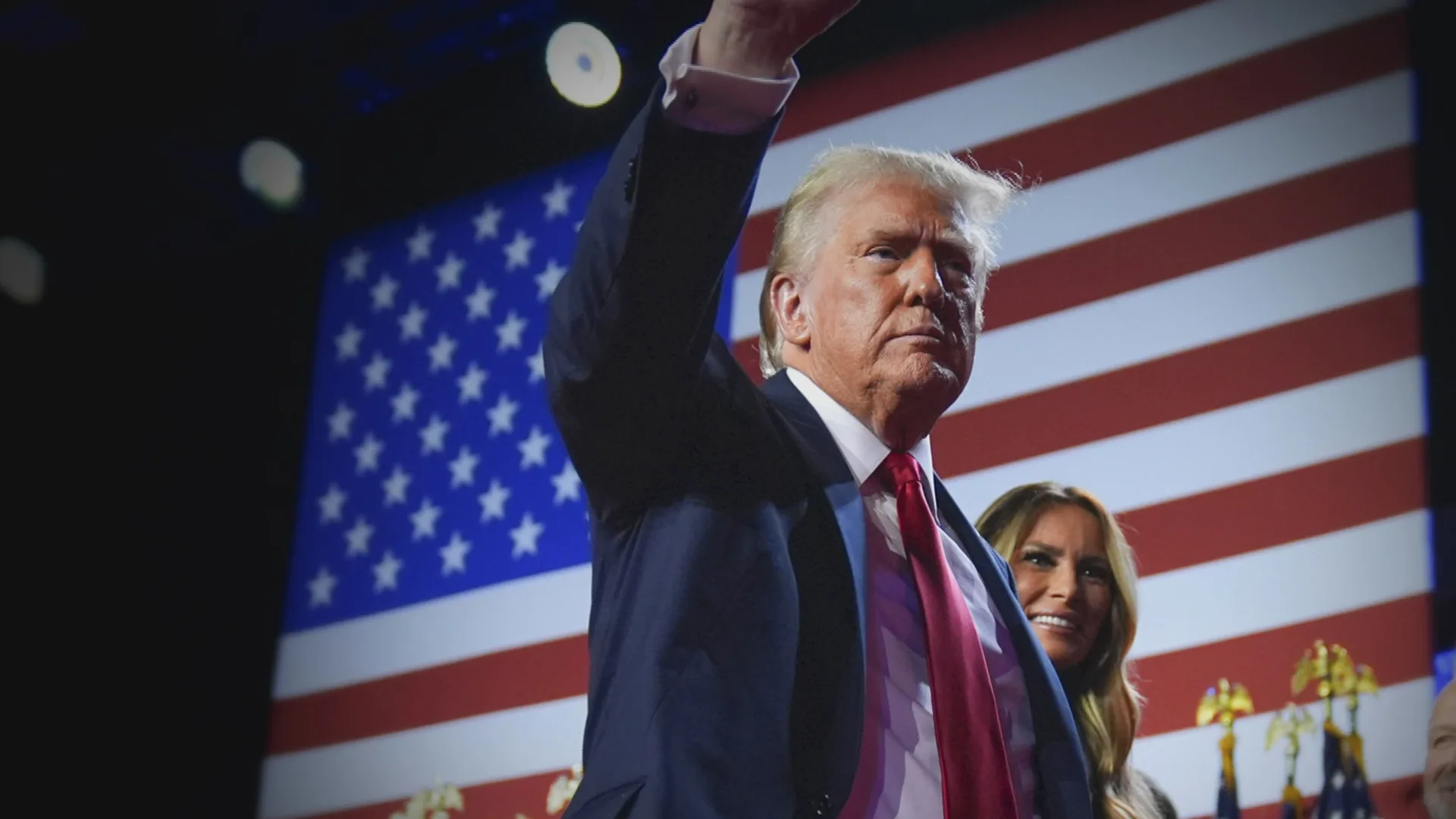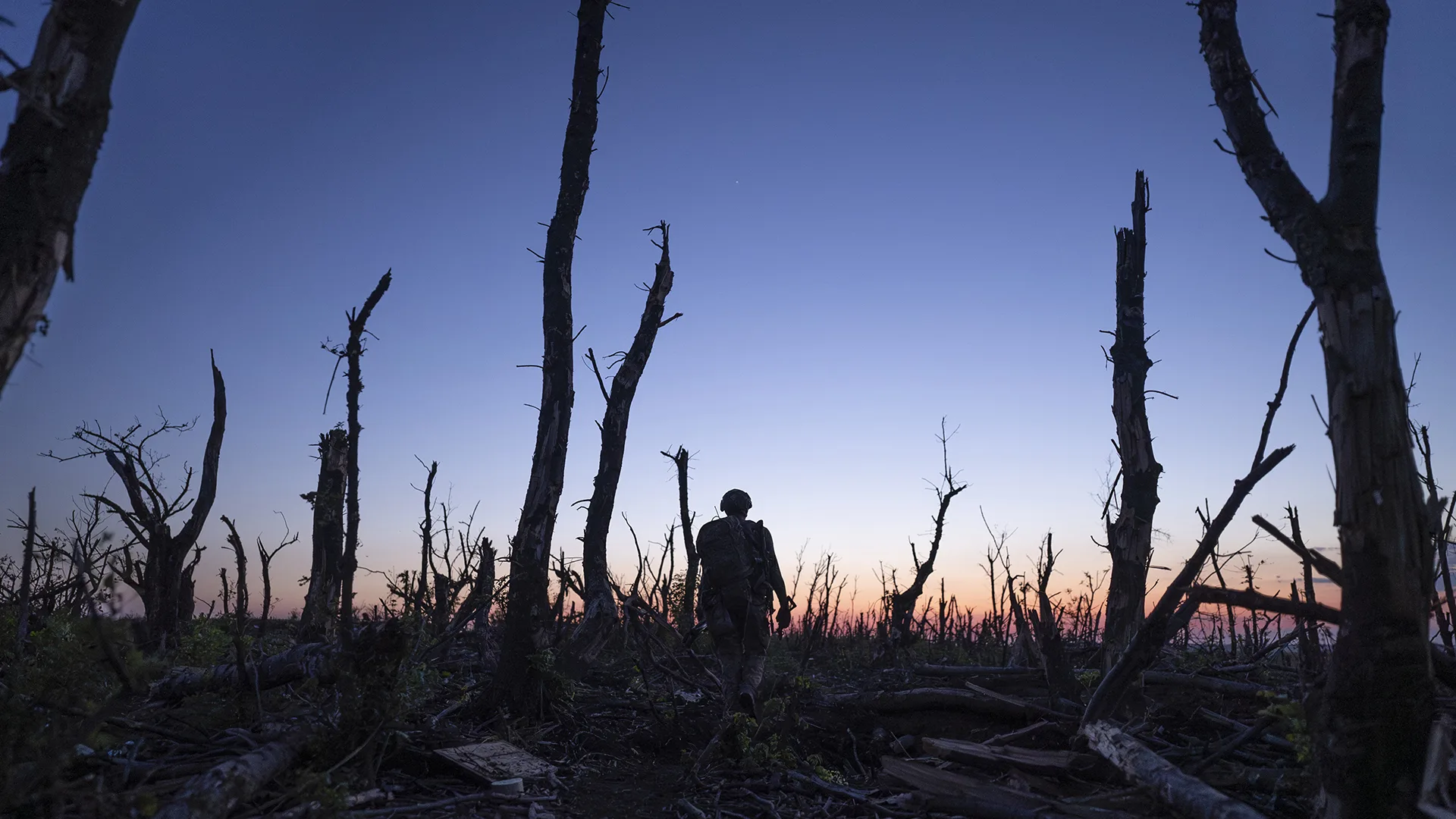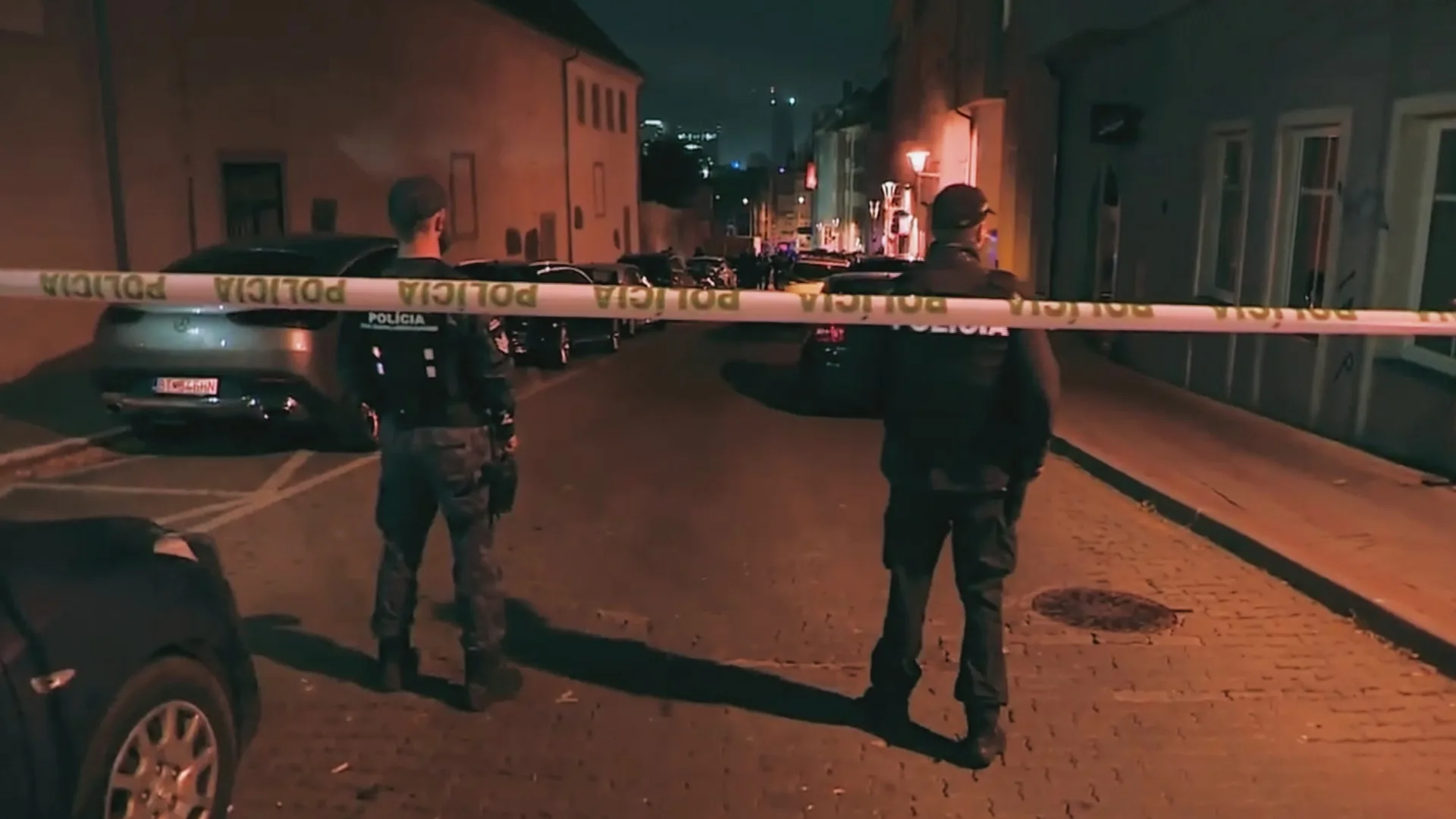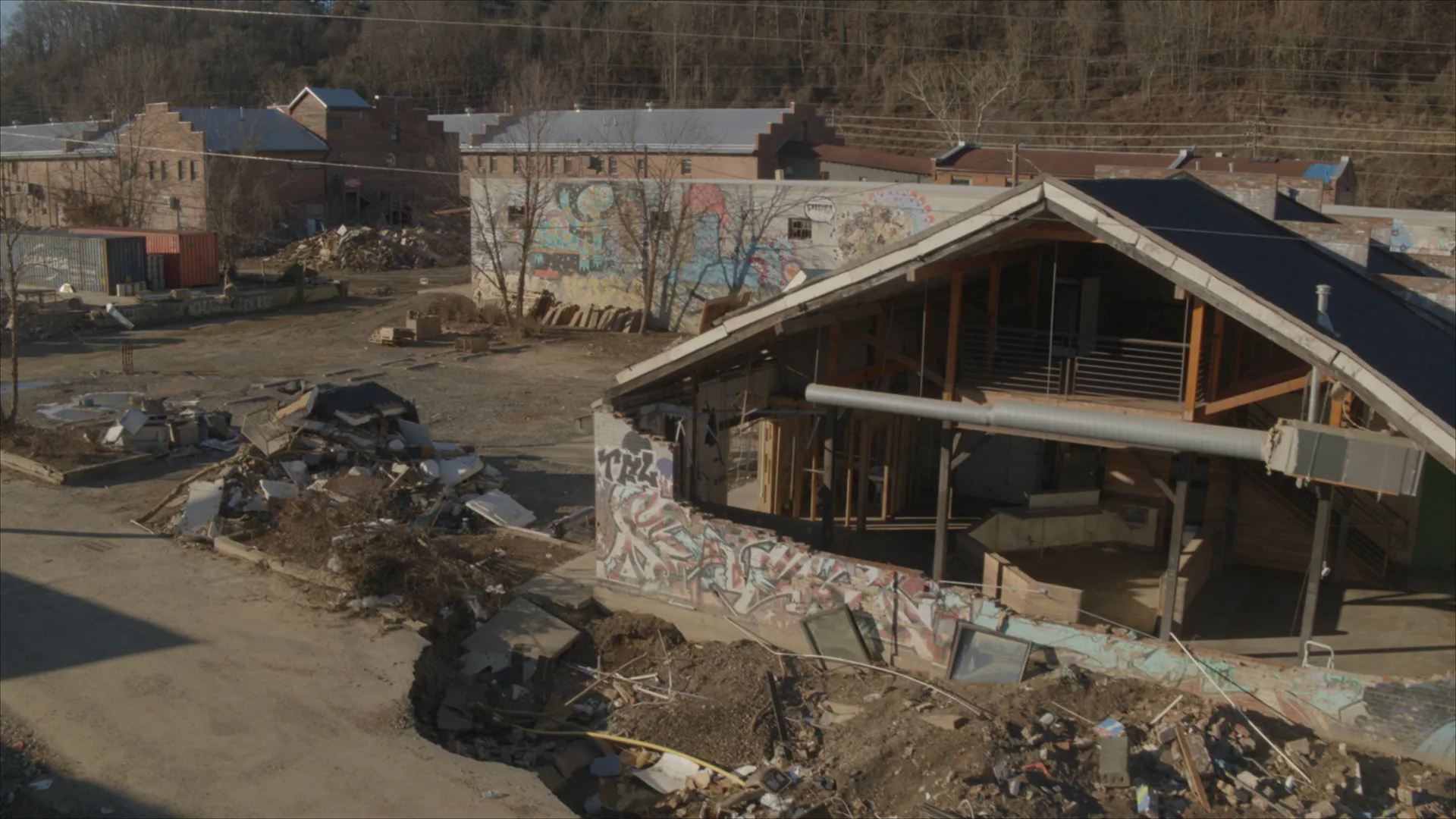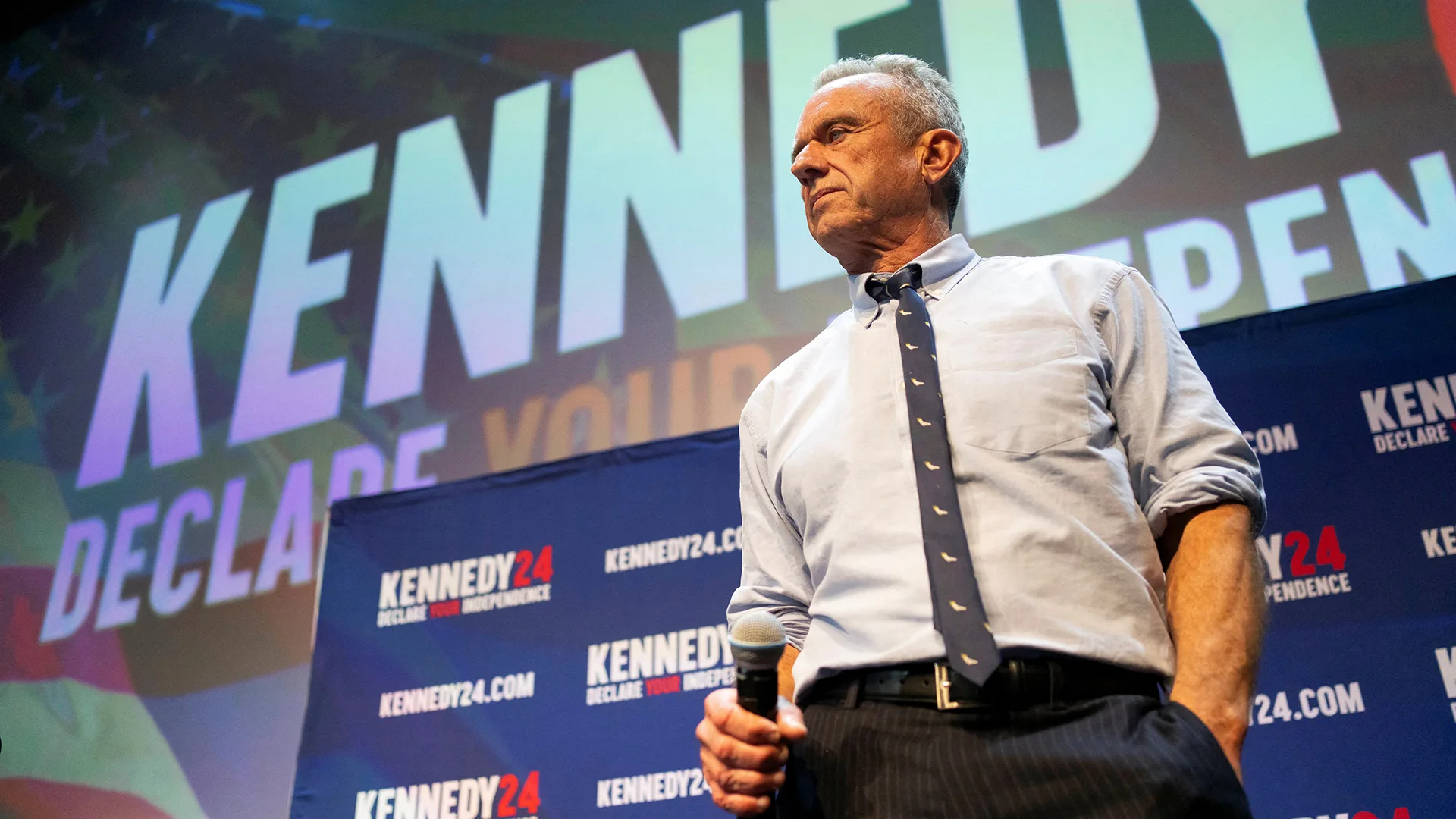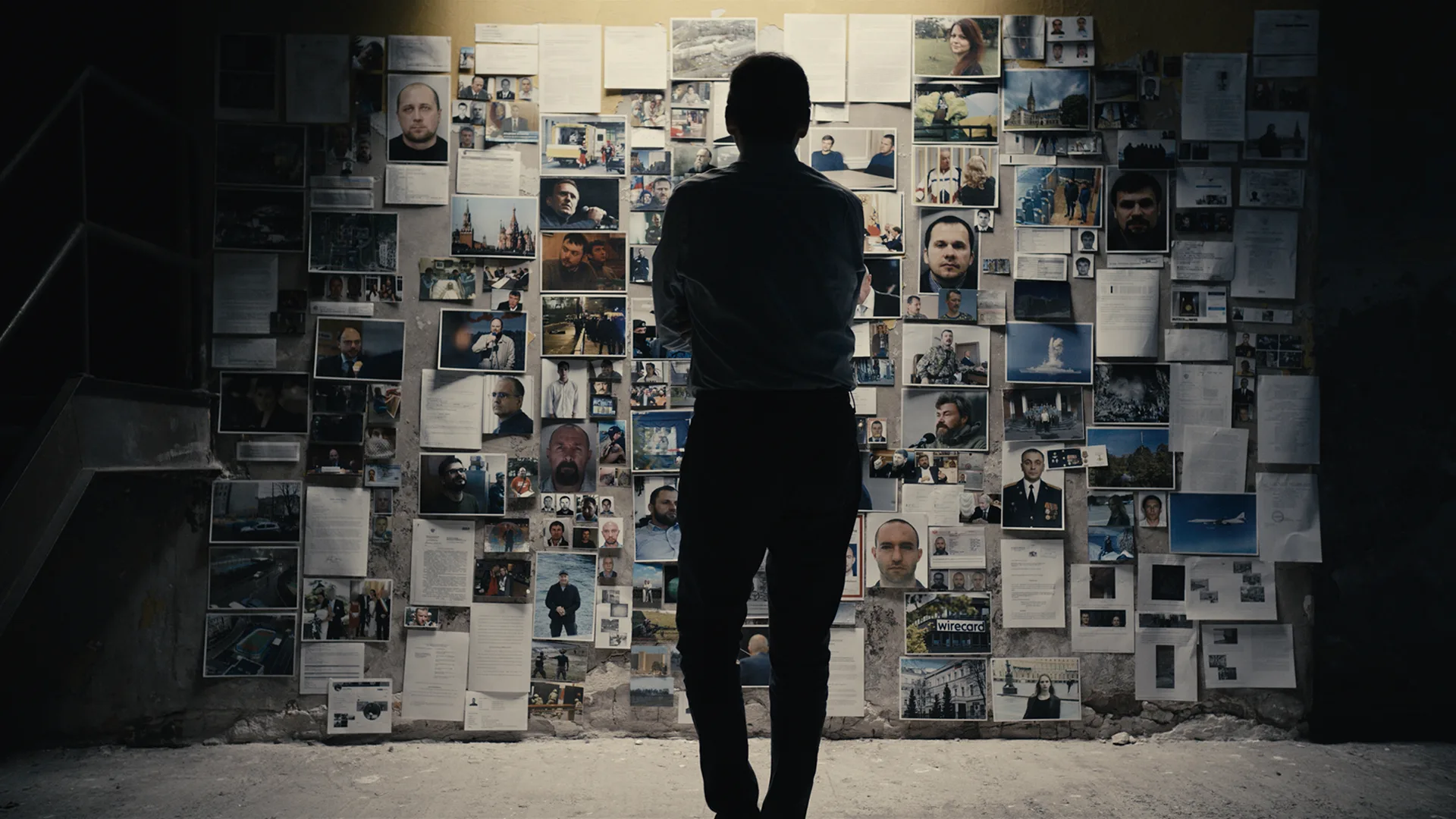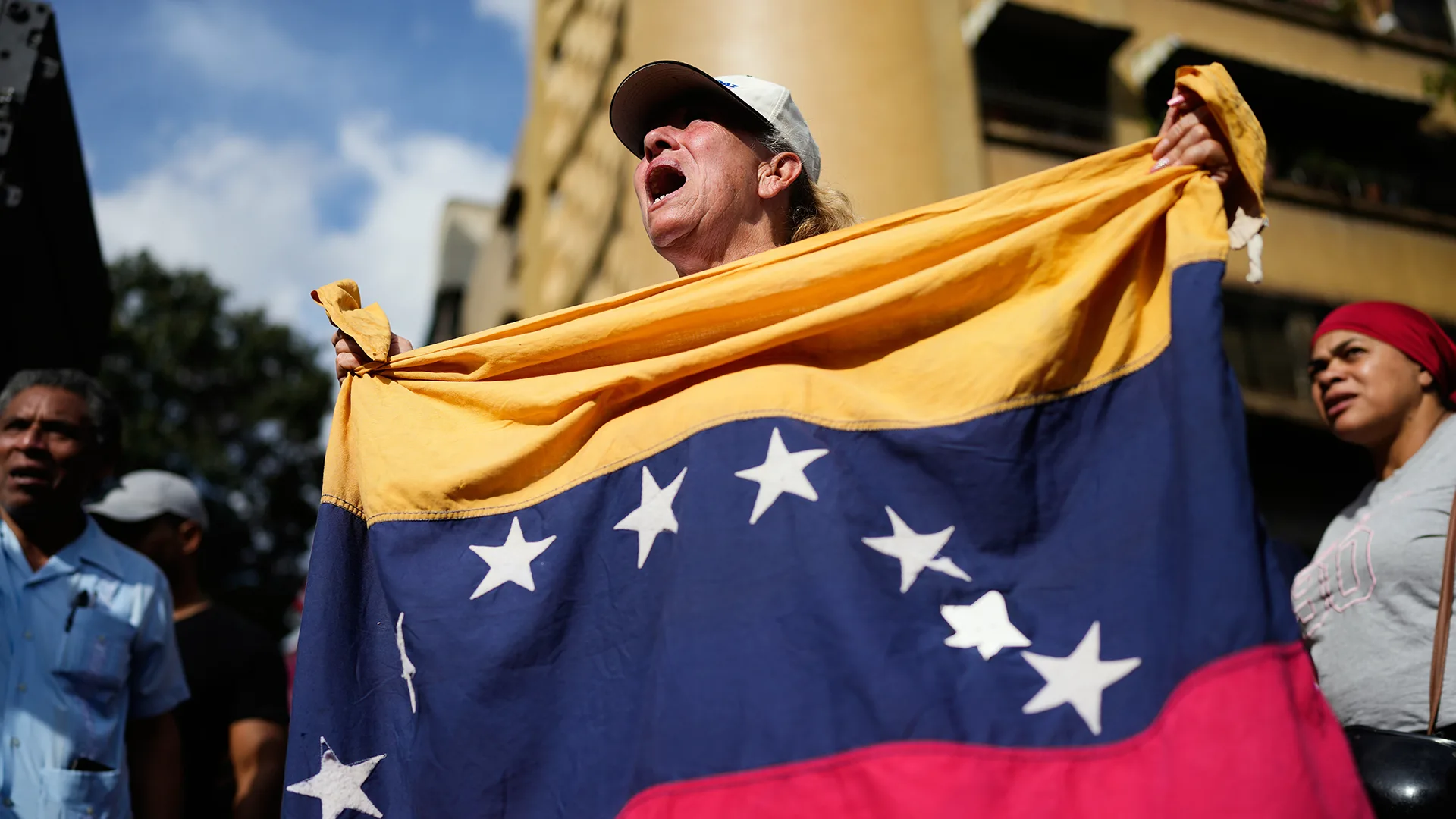Battle for Tibet
February 18, 2025
54m
FRONTLINE investigates China’s rule over Tibet
Battle for Tibet
February 18, 2025
54m
Share
FRONTLINE investigates China’s rule over Tibet. With footage from inside the region, the documentary examines how the Communist regime controls Tibet’s Buddhist population, and the battle over the succession of its spiritual leader, the Dalai Lama.
Support provided by:
Learn More
Most Watched
The FRONTLINE Newsletter
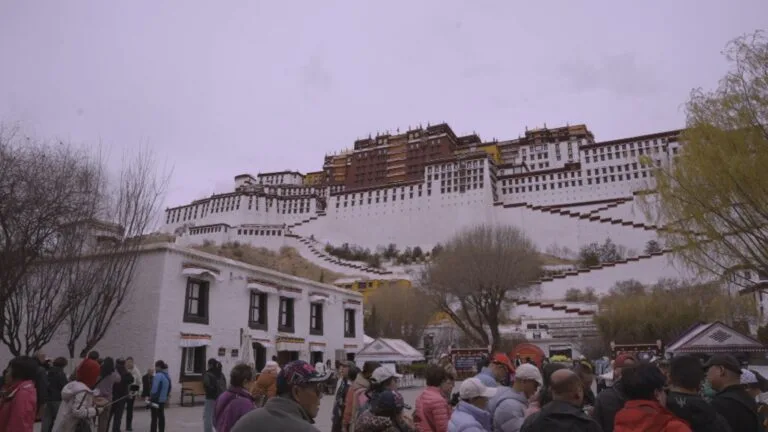
Life in Tibet and What Comes Next
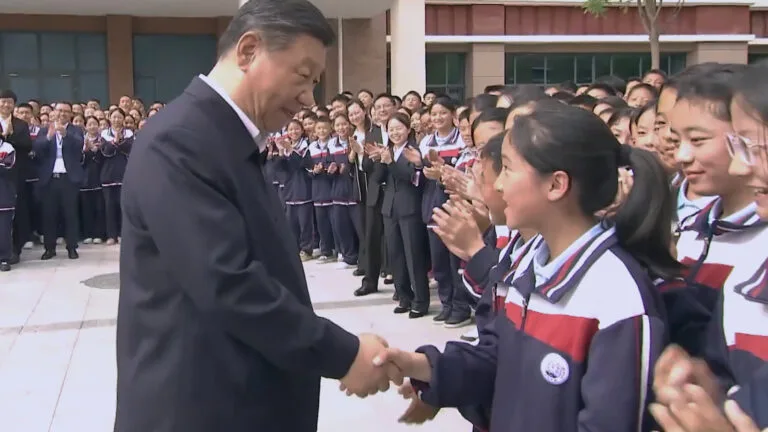
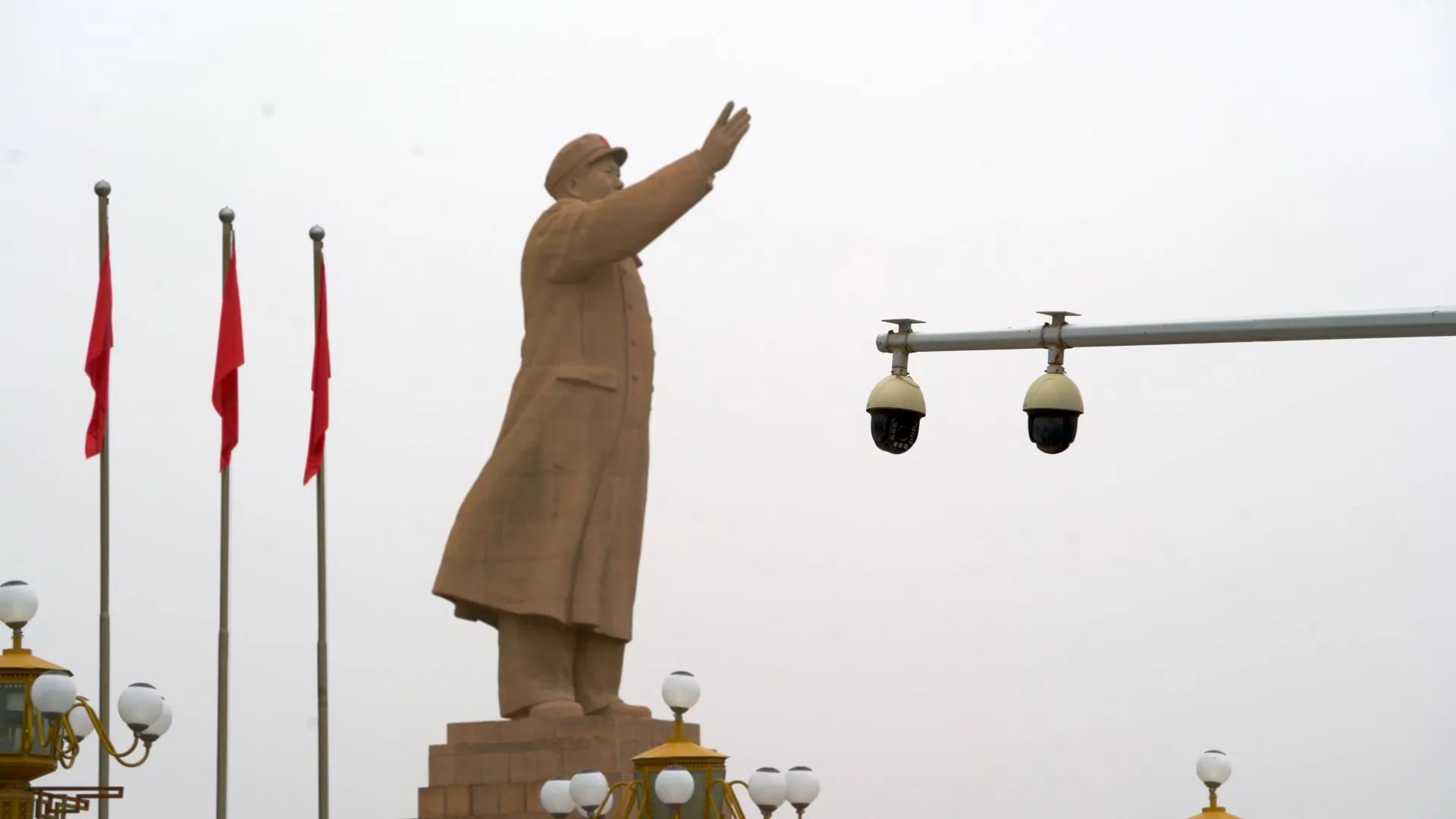
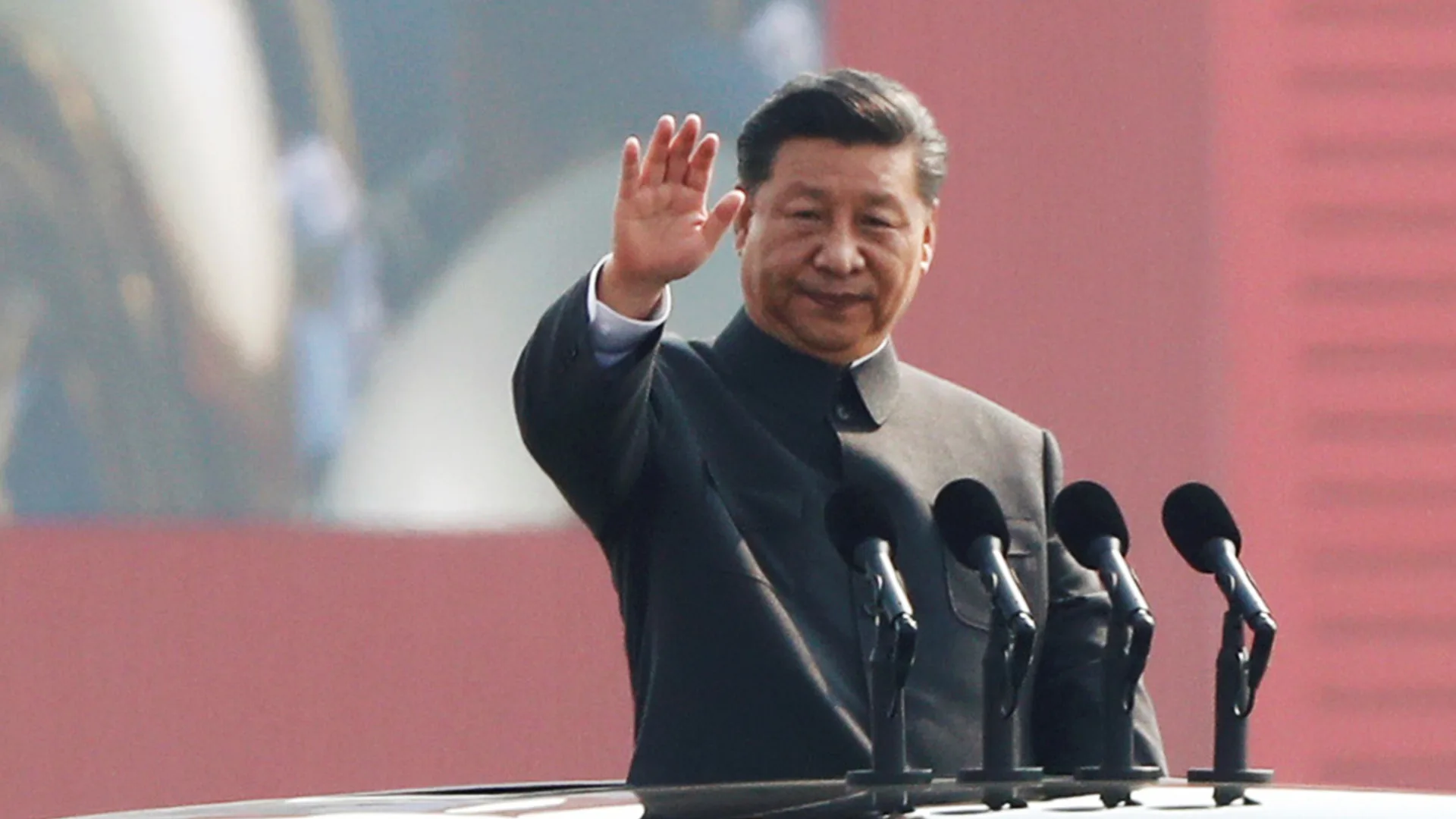
Related Stories

Boarding Schools Teach Tibetans to ‘Become More Chinese’
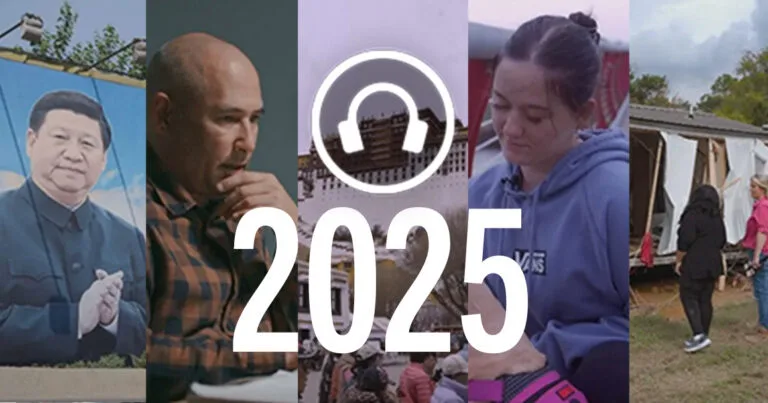
Listen to the Top 5 ‘FRONTLINE Dispatch’ Podcast Episodes of 2025


China, the U.S. & the Rise of Xi Jinping

Life in Tibet and What Comes Next
Related Stories

Boarding Schools Teach Tibetans to ‘Become More Chinese’

Listen to the Top 5 ‘FRONTLINE Dispatch’ Podcast Episodes of 2025


China, the U.S. & the Rise of Xi Jinping

Life in Tibet and What Comes Next
This program contains graphic imagery. Viewer discretion is advised.
NAMKYI:
[Speaking Tibetan] I crossed high snow mountains, sand and forests.
NARRATOR:
In 2023, after protesting Chinese rule, Namkyi fled her home in Tibet, making a perilous journey across the Himalayas.
NAMKYI:
[Speaking Tibetan] I was thinking I could get caught by the Chinese and imprisoned again. It took 10 days. After arriving in India, I felt a burden was lifted, as nobody was intimidating me.
I want to tell you my own true story and about the situation inside Tibet. The true situation in Tibet isn’t allowed to be seen.
Chinese government video
GOVERNMENT VIDEO NARRATOR:
This is Tibet, China. The roof of the world. Its cultural heritage is well-protected. Freedom of religion is fully guaranteed.
NAMKYI:
[Speaking Tibetan] China only shows the beautiful and good parts. We’ve suffered so much.
NARRATOR:
Namkyi is part of a struggle that has raged for 75 years, since China, which has long claimed Tibet, invaded the mountain territory.
NAMKYI:
[Speaking Tibetan] China subjects us to repression, both mentally and physically. However, our faith and trust in the Dalai Lama can never be shaken.
MALE VOICE:
Ladies and gentlemen, His Holiness the 14th Dalai Lama.
NARRATOR:
At the center of the struggle: Tibet’s exiled Buddhist leader, the Dalai Lama, who for the past six decades has been the living symbol of resistance to China.
NAMKYI:
[Speaking Tibetan] His Holiness the Dalai Lama is the heart, soul and snow mountain of the Tibetan people. I feel he’s a necessity in my life. Without him, my life would have no value.
NARRATOR:
As a child, Namkyi watched as protests against China escalated.
MALE PROTESTER:
[Speaking Tibetan] We need human rights. Allow His Holiness the Dalai Lama to return. Allow His Holiness the Dalai Lama to return immediately.
NARRATOR:
In 2008, protests by monks led to widespread demonstrations that were violently put down by Chinese authorities.
NAMKYI:
[Speaking Tibetan] Many people protested, mainly demanding the return of the Dalai Lama to Tibet. Many Tibetans were arrested and tortured.
NARRATOR:
After the crackdown, some Tibetans resorted to extreme acts of protest. Human rights organizations say around 160 Tibetans have burned themselves alive since 2009. Despite China’s tight control, occasionally footage of these protests has surfaced. This one, from 2012, shows 22-year-old Ngawang Norphel and his friend.
MALE PROTESTER:
[Speaking Tibetan] My cultural tradition and freedom are disappearing. Is it China or is it Tibet?
NAMKYI:
[Speaking Tibetan] I couldn’t control my mind with such painful suffering. So I protested against China.
NARRATOR:
In 2015, she started her own protest outside a monastery in the town of Ngaba.
NAMKYI:
[Speaking Tibetan] We held up photos of His Holiness and walked from the gate of Kirti Monastery into the market street. We shouted, “Long live His Holiness Dalai Lama. Allow him to return to Tibet. Tibet must be free.”
NARRATOR:
The protest was filmed and later posted online.
NAMKYI:
[Speaking Tibetan] Long live the Dalai Lama.
We walked past the police station. They beat us mercilessly with police batons. I was worried I would be killed.
NARRATOR:
She was 15 at the time. The police arrested her and she was charged with “separatist acts against the nation.”
NAMKYI:
[Speaking Tibetan] We were sentenced to three years.
NARRATOR:
During her time in prison, she says a Communist Party official subjected her to political reeducation sessions.
NAMKYI:
[Speaking Tibetan] She was there to reform my mind. She said this was the law and that I had broken it. She said there was no separate Tibet.
NARRATOR:
After her release, she says she was under relentless police surveillance.
NAMKYI:
[Speaking Tibetan] I was even more closely watched, more restricted and more criminalized. I wasn’t allowed to associate with any close relatives or friends.
NARRATOR:
Eventually, she made the painful decision to flee to India, knowing she might never see her family again.
NAMKYI:
[Speaking Tibetan] Sometimes I miss them. I miss them.
NARRATOR:
India has become the de facto refuge for many Tibetans. The Dalai Lama has remained there since his own exile in 1959, living in a heavily guarded compound in Dharamshala. Approaching 90, he now rarely grants interviews. But he has repeatedly said he is no longer seeking Tibetan independence and would accept self-rule within China.
2015
DALAI LAMA:
We are not seeking independence. We are very much willing remain within the People’s Republic of China, provided they should respect Tibetan culture, Tibetan unique language and Tibetan environment.
NARRATOR:
Nevertheless, China has continued to call the Dalai Lama an anti-China separatist and taken a hard-line stance on him.
Professor Robert Barnett is a renowned expert on Tibet, where he’s worked and lived. In 1994, he obtained China’s internal policy documents on Tibet and the Dalai Lama.
ROBERT BARNETT, Author, Cutting Off the Serpent’s Head:
Among those documents was a little booklet, and it was called “A Golden Bridge Leading into a New Era.” We gradually realized this is extraordinary, this is exceptional. This was directly saying what policies were going to be, and they were new policies. This is what seems to be a major turning point from a, shall we say a soft policy towards the Dalai Lama, slightly cooperative, to a hard policy.
This paragraph says, “The focal point in our region’s fight to oppose separatism is to oppose the Dalai clique. As the saying goes, ‘to kill a serpent we must first chop off its head.’ If we don’t do that, we cannot succeed in the struggle against separatism.”
Clearly, the decision here is that he’s the enemy.
They’re saying we must treat him as a hypocrite, as someone who’s always lying, who’s someone who’s always trying to get independence, whatever he says. We can only destroy that movement by eliminating the Dalai Lama’s strength, by destroying him as a political force, and their method of destroying him was the demonization of the Dalai Lama.
All Chinese policy since 1994 has been based on that decision: Demonize the Dalai Lama. Blame him for everything as an individual.
NARRATOR:
The Chinese government wouldn’t agree to an interview, but in written responses it repeated its position that the Dalai Lama is a separatist working “under the cloak of religion.” It said Tibet has been part of China since ancient times.
VICTOR GAO, Center for China and Globalization:
For China, it’s a life-or-death issue. Any attempt to push for Tibetan independence will be crushed, with force. And anyone trying to agitate for Tibetan independence, either at home in China or abroad, will end up with miserable failure.
NARRATOR:
Victor Gao is a well-known defender of China and advocate of its rule in Tibet. He runs a think tank in Beijing.
VICTOR GAO:
For the Chinese government, for the Chinese nation, the thing is very simple. There is only one China, and Tibet is part of China. We need to defend China’s sovereignty and territorial integrity very fiercely. And China is always ready to defend China’s sovereignty and territorial integrity, regardless of whoever wants to instigate some crisis or confrontation.
We are all one family, and the Tibetans are our brothers and sisters. They are an integral part of the Chinese nation.
NARRATOR:
China heavily restricts the international media’s access to Tibet. But we worked with a journalist who agreed to travel there and film undercover.
UNDERCOVER REPORTER:
[Speaking Mandarin] I know it’s very high-risk going to Tibet. I need to be very cautious and careful every hour of every day.
NARRATOR:
For his safety, we’re concealing his identity.
The Tibetan population lives in what China calls the Tibet Autonomous Region and parts of neighboring Chinese provinces. The region makes up about a quarter of modern China. It is a sparsely populated and rugged territory.
UNDERCOVER REPORTER:
[Speaking Mandarin] Entering Tibet as an investigative journalist, I was quite tense and also cautious.
NARRATOR:
Our colleague is on his way to Lhasa, the Tibetan capital.
UNDERCOVER REPORTER:
[Speaking Mandarin] The main aim of my journey into Tibet is to learn what is really happening.
NARRATOR:
In the city center he estimates there are police posts every 500 meters.
UNDERCOVER REPORTER:
[Speaking Mandarin] I saw a lot of surveillance cameras. Almost every intersection had a police post.
MALE VOICE:
[Speaking Mandarin] Stop filming.
NARRATOR:
In another city, a Chinese man who moved to Tibet says that protests against Chinese rule continue despite the surveillance.
MALE SPEAKER:
[Speaking Mandarin] Tibetans here, generally speaking, do not harm others. When they make trouble, they pour gas onto themselves, drink it, set themselves on fire and start running down the street. It still happens.
UNDERCOVER REPORTER:
[Speaking Mandarin] It still happens today?
MALE SPEAKER:
[Speaking Mandarin] Yes, two self-immolated recently.
They are blind believers. They believe in their religion, Buddhism.
NARRATOR:
Tibet’s monasteries have historically been at the heart of resistance to Chinese rule. The security is tight for worshippers and visitors alike.
UNDERCOVER REPORTER:
[Speaking Mandarin] Visiting a monastery in Tibet, you usually have to scan your identity card, and these machines do facial recognition.
NARRATOR:
Inside, there are surveillance cameras throughout the monasteries.
In a cafe near one monastery, a Tibetan official says that Tibetans working for the Chinese government are prohibited from even going into monasteries.
UNDERCOVER REPORTER:
[Speaking Mandarin] You, as locals, often go on pilgrimages to monasteries?
MALE TIBETAN OFFICIAL:
[Speaking Mandarin] Not allowed to go. Government employees can’t go. Here, in the past, all people believed in religion. We would all go, before the regulations. Family members and parents would take us.
So, the government pays attention to this. Government employees and officials aren’t allowed to go. If you are caught on camera you’ll be expelled. [Laughs]
NARRATOR:
In its responses, the Chinese government did not address its use of surveillance but insisted that Tibetans’ religious freedoms are being protected and that human rights are at their “historical best.”
VICTOR GAO:
The Chinese government has no interest in doing surveillance of religious practices. What the Chinese government is interested in is preventing anyone from misusing or abusing religion as a pretext to launch terrorist attacks.
GREG WALTON:
Surveillance is at the heart of this process of subjugating the Tibetan people. Live face recognition systems. Scanning systems that will monitor your mobile phone signal. Internet surveillance, in terms of what people are browsing.
NARRATOR:
Greg Walton is a surveillance expert who has studied the systems China is using.
GREG WALTON:
Digital surveillance in the monasteries is supplemented, augmented with perhaps six or seven thousand party officials installed in the monasteries. The desire to control, to instill a sense of fear, very deliberately create a chilling effect society-wide.
UNDERCOVER REPORTER:
[Speaking Mandarin] There are many plainclothes police officers in Tibet. Everyone is very careful, cautious and doesn’t speak out.
NARRATOR:
Our colleague filmed at the Potala Palace in Lhasa, a World Heritage site from where the Dalai Lama once ruled Tibet. But there are no pictures or mention of the Dalai Lama there today.
UNDERCOVER REPORTER:
[Speaking Mandarin] Our tour guide at the Potala Palace didn’t dare talk much about the Dalai Lama.
MALE TAXI DRIVER:
[Speaking Mandarin] We can’t talk.
UNDERCOVER REPORTER:
[Speaking Mandarin] You can’t talk? Even you can’t talk about him?
MALE TAXI DRIVER:
[Speaking Mandarin] We can’t.
UNDERCOVER REPORTER:
[Speaking Mandarin] Is it a decision from above that people can’t talk?
MALE TAXI DRIVER:
[Speaking Mandarin] Yes.
UNDERCOVER REPORTER:
[Speaking Mandarin] The locals, both Tibetans and ethnic Han Chinese, already have a self-censorship mechanism. They all know what kinds of things can and can’t be discussed.
NARRATOR:
Images of Chinese President Xi Jinping hang over the streets. The taxi driver says that Communist officials are stationed in Tibetan villages and neighborhoods.
UNDERCOVER REPORTER:
[Speaking Mandarin] I saw many places with his portrait [President Xi].
MALE TAXI DRIVER:
[Speaking Mandarin] Yes. We have his portraits at home, one in each household. All were given out by the neighborhood committee.
UNDERCOVER REPORTER:
[Speaking Mandarin] They gave them to you?
MALE TAXI DRIVER:
[Speaking Mandarin] Yes, to each household. Everyone hangs them in their home.
ROBERT BARNETT:
You can see why Communist officials would be really very uncomfortable about a charismatic leader like the Dalai Lama. They think that loyalty should be to the party, especially under Xi Jinping.
They’re gradually reducing the content of the religion but not eliminating it. This is what they call sinicization of religion, so that it becomes less Tibetan.
Chinese promotional video
TIBETAN GIRL:
[Singing in Mandarin] Sing a folk song to the party. The party is like a mother to me. My mother gave birth to my body. But it’s the brilliance of the party that shines my heart.
TSERING DAWA:
[Singing in Mandarin] “Without the Communist Party, there is no new China. Without the Communist Party, there is no new China.”
[Speaking Tibetan] At school in China on Saturdays, we had to sing Communist military songs.
NARRATOR:
Tsering Dawa fled Tibet in 2020. He says he drew the attention of the Chinese authorities when he sent voice messages to a Tibetan rights group in India.
TSERING DAWA:
[Speaking Tibetan] I told her on that there is no freedom in Tibet and we are not given passports. There is no freedom of religion and Tibetans are looked down upon. It’s like living in prison.
NARRATOR:
He says the police who arrested him had a printout of his messages.
TSERING DAWA:
[Speaking Tibetan] I was treated badly. I was hit on the head. It left these scars. I wasn’t taken to the hospital.
NARRATOR:
He admitted to sending the messages but refused to confess to campaigning for Tibetan independence—a charge that can lead to a 20-year prison sentence.
TSERING DAWA:
[Speaking Tibetan] For 11 months, they detained me. During this time, you couldn’t see any sunlight inside the room. I tried to control my mind with Buddhist meditation.
My biggest fear was not knowing what would happen in the future, and secondly, the fear of being put in prison for 20 years.
NARRATOR:
In the years after being released, he began providing information to a foreign news outlet about conditions in Tibet. But he eventually feared he’d be arrested again, and fled.
TSERING DAWA:
[Speaking Tibetan] It is like a big prison, a massive prison. In this huge prison, via your phone you are being monitored, as to what you are thinking and what you are communicating to others.
It’s very sad that I had to leave my homeland. However, I had no choice but to go. I feel I would be in prison if I had stayed.
NARRATOR:
China’s efforts to maintain control over Tibet are playing out in other ways. It has long been pursuing a campaign to choose the next Dalai Lama.
ARJIA RINPOCHE:
[Speaking Tibetan] It’s been around 25 years since I went to exile. I managed to escape from the danger of the dragon’s mouth.
NARRATOR:
Arjia Rinpoche now runs a monastery in the United States. But until 1998, he lived under Chinese rule in Tibet, holding senior positions within Tibetan Buddhism.
ARJIA RINPOCHE:
[Speaking Tibetan] Looking back now, the Chinese Communist Party restricts our religion, our monastic system, our reincarnation system and all aspects of life.
NARRATOR:
He says he was at the heart of a power struggle to decide who would select the next Dalai Lama.
ARJIA RINPOCHE:
[Speaking Tibetan] I witnessed things with my own eyes. The Chinese government doesn’t want people to know about this.
NARRATOR:
Arjia Rinpoche became a top aide to the Panchen Lama—the Buddhist leader tasked with identifying the successor to the Dalai Lama when he dies.
But suddenly, in 1989, the Panchen Lama died.
January 29, 1989
FEMALE NEWSREADER:
One of Tibet’s most senior religious leaders, the Panchen Lama, has died of a heart attack. He was second only to the Dalai Lama, who has lived in exile in India for 30 years.
NARRATOR:
It would be a crucial moment for China’s influence on the Tibetan hierarchy.
ARJIA RINPOCHE:
[Speaking Tibetan] The passing of the Panchen Lama was like the sun falling from the sky. It was hugely damaging for us.
As we thought about what was in store for the future, it became clear. They want to interfere with the next reincarnation of the Dalai Lama.
NARRATOR:
Chinese authorities placed Arjia Rinpoche on a committee to select the next Panchen Lama. Behind closed doors, he says the authorities made it clear they were in charge.
ARJIA RINPOCHE:
[Speaking Tibetan] The Chinese government said the Dalai Lama’s opinions and suggestions would be taken into consideration. However, the final decision would be made by the Chinese government.
NARRATOR:
According to Tibetan Buddhists, when a Dalai Lama or Panchen Lama dies, he is reincarnated into a new person.
The committee searched for boys who might be the Panchen Lama’s reincarnation.
Secretly, the head of the search committee sent their names to the Dalai Lama in India. He made his choice—without consulting the Chinese government.
MALE VOICE ON RADIO:
Welcome to the Voice of America in Tibetan.
MALE VOICE ON RADIO:
[Speaking Tibetan] The Dalai Lama announced Gedhun Choekyi Nyima as the reincarnation of the 10th Panchen Lama.
ARJIA RINPOCHE:
[Speaking Tibetan] After the announcement, the Chinese government strongly opposed it. They said it was an illegal act.
NARRATOR:
Within days, the 6-year-old boy the Dalai Lama had selected was taken away by Chinese authorities, along with his family. His whereabouts have remained a mystery.
ARJIA RINPOCHE:
[Speaking Tibetan] Anyone would feel frightened and anxious. I felt this could happen to any of us.
NARRATOR:
Chinese soldiers surrounded the monastery of the monks who identified the boy after they refused to denounce the Dalai Lama’s choice.
We spoke to one of the monks, who now lives in exile. He asked that his identity be concealed.
TIBETAN MONK:
[Speaking Tibetan] They carried out political reeducation on the monks at Tashi Lhunpo Monastery. Many monks were imprisoned. Monks committed suicide.
They forced all of us to pledge that the Dalai Lama was a separatist and that he was splitting up the country. Essentially the monastery went through a drastic transformation and it became like a military camp.
NARRATOR:
The monastery’s abbot, Chadrel Rinpoche, had led the search committee. He was arrested and detained and never publicly seen again.
Arjia Rinpoche and the remaining members of the search committee were summoned to Beijing.
ARJIA RINPOCHE:
[Speaking Tibetan] They said the Dalai Lama was a separatist and that he was campaigning for Tibet’s independence. And it was wrong of him to recognize the reincarnation of the Panchen Lama.
NARRATOR:
The committee was ordered to start a new search.
JIANG ZEMIN, President of China, 1993-2003:
[Speaking Mandarin] With regard to the search and recognition of the reincarnated soul boy of the Panchen Lama, proceed and complete this mission as soon as possible.
NARRATOR:
As ordered, new candidates were found.
Chinese government video
MALE GOVERNMENT SPEAKER:
On Nov. 29, 1995, a golden urn lot-drawing ceremony, in line with religious rituals and respecting historical customs, was solemnly held in front of the statue of Shakyamuni at Jokhang Temple in Lhasa. The ceremony was hosted—
NARRATOR:
The Chinese government provided this video. They said it shows that the process followed Buddhist traditions.
MALE GOVERNMENT SPEAKER:
The sealed names were placed in the golden urn by Monk Tshering of Tashi Lhunpo Monastery.
ARJIA RINPOCHE:
I’m there.
NARRATOR:
Arjia Rinpoche says he and other Buddhist officials were taken there late at night. The temple was surrounded by soldiers.
ARJIA RINPOCHE:
[Speaking Tibetan] They said if you spoke up, or behaved out of line, you wouldn’t be forgiven. They threatened us by saying they’re prepared to stop and eliminate anyone, whoever they may be.
NARRATOR:
The selection of the boy who would become the Panchen Lama was broadcast on China state TV.
MALE SPEAKER:
[Speaking Mandarin] Gyaltsen Norbu has been picked.
ARJIA RINPOCHE:
[Speaking Tibetan] It was an utterly sad moment.
MALE SPEAKER:
[Speaking Mandarin] Gyaltsen Norbu’s lot has been picked.
NARRATOR:
Gyaltsen Norbu, the son of two Communist Party members, was now the Chinese-approved 11th Panchen Lama—the figure who according to Tibetan Buddhism could one day determine the next Dalai Lama.
ARJIA RINPOCHE:
[Speaking Tibetan] The way it was conducted was utterly unacceptable for us. Even though we disagreed, we couldn’t speak up, not even a word.
NARRATOR:
Arjia Rinpoche says he was asked to tutor the new Panchen Lama. But instead he fled abroad.
ARJIA RINPOCHE:
[Speaking Tibetan] I was being forced to have faith in someone I didn’t believe in and do things I didn’t want to do.
NARRATOR:
The boy went on to be educated in Beijing, and as he has grown up has publicly advocated for Chinese rule in Tibet.
GYALTSEN NORBU:
[Speaking Mandarin] Only under the leadership of the Communist Party can Tibet achieve today’s development, prosperity and such a bright future.
NARRATOR:
We obtained undercover footage from a remote part of Tibet: Lhari, where the missing Panchen Lama was born. We were told police subject visitors to extensive checks, including facial recognition. Chinese flags and party slogans were visible on the streets. But there was no sign of the boy’s life there.
“Safeguard the motherland”
KATE SAUNDERS:
The issue of the Panchen Lama is treated as a matter of national security, and that’s tied to the survival and legitimacy of the Chinese Communist Party. So the stakes couldn’t be higher. So that means if you even talk about the disappearance, if you even have some sort of tiny little picture of him as a child in your home, all of that can be penalized, seriously penalized.
NARRATOR:
Kate Saunders has done extensive research on the story of the Panchen Lama. She tracked down a rare photo of the missing boy.
KATE SAUNDERS:
The Tibetan script reads “photograph of a family reunion.” It seems to show Gedhun Choekyi Nyima. He’s got a toy helicopter. He’s sitting on his father’s lap. He could be around 10, around 11.
This looks as though it’s in some sort of official compound. And it does show us that the family was still together at that point.
I believe it’s genuine, but we still haven’t been able to fully confirm that.
It shows how successfully China has been able to disappear not only the child, but also his entire family, and to exclude them from any sort of public gaze whatsoever.
NARRATOR:
The Chinese government told us the “so-called reincarnated child is an ordinary Chinese citizen, living a normal life. He and his family do not want to be disturbed.”
Chinese promotional video
MALE PROMOTIONAL SPEAKER:
Poverty here is a thing of the past.
NARRATOR:
The Chinese government also stressed to us that because of its rule, life in Tibet is “significantly better” for the people.
MALE PROMOTIONAL SPEAKER:
Tibet’s children now enjoy 15 years of public-funded education.
NARRATOR:
But inside Tibet, our reporter meets a mother who says ever since her children went to school, they’ve stopped speaking Tibetan.
UNDERCOVER REPORTER:
[Speaking Mandarin] Do they go to local schools?
TIBETAN MOTHER:
[Speaking Mandarin] Yes.
UNDERCOVER REPORTER:
[Speaking Mandarin] Their language of instruction is mainly Chinese?
TIBETAN MOTHER:
[Speaking Mandarin] Right. They don’t speak our language. Only Chinese, starting from kindergarten and primary school.
Now we can’t teach them. They do not listen to us, they just speak Chinese.
CROWD OF TIBETAN STUDENTS:
[Speaking Mandarin] Hello, Grandpa Xi. Hello, Grandpa Xi.
NARRATOR:
Chinese President Xi Jinping’s government has placed around 800,000 Tibetan children into boarding schools, where they are taught in Mandarin.
PRESIDENT XI JINPING:
[Speaking Mandarin] Treasure these good conditions. Study hard. You will have a lot of opportunities in your lives.
NARRATOR:
The government told us the boarding schools are important in a region with a highly scattered population and are examples of “human rights and cultural heritage protection.”
In recent years, the program has expanded to include children as young as 4.
VICTOR GAO:
I hope every Tibetan will speak both Tibetan language as well as Mandarin. Why? Because if you do not speak Mandarin, then it will be more difficult for you to find a more meaningful job. You will be more handicapped in communicating with the rest of the country.
ROBERT BARNETT, Prof., University of London:
The Xi Jinping mission is to say, “We have to start from childhood.” So now the policy is to have kindergartens teaching in Chinese language to get them speaking Chinese, and basically only Chinese, when they’re in a kindergarten. They’re all going to become more Chinese.
GYAL LO:
[Speaking Tibetan] I have great concerns about the future generation of Tibetans inside Tibet.
NARRATOR:
Gyal Lo is a sociologist and advocate who was born in Tibet. In 2016, he was living in one of the Chinese provinces when his brother called him, concerned about his grandchildren.
GYAL LO:
[Speaking Tibetan] He said I should come home at once. He said both of the children had become strangely different. They’d forgotten the Tibetan they knew and could no longer speak it properly. The parents and the children couldn’t have a proper conversation with each other in Tibetan. I saw it was a serious matter.
NARRATOR:
Gyal Lo set out to investigate what was happening in schools across Tibet.
GYAL LO:
[Speaking Tibetan] In 2017, 2018, 2019 and 2020 I traveled all around, visiting the schools to investigate.
NARRATOR:
Keeping a low profile, he visited more than 50 kindergarten boarding schools for Tibetan children. He says he discovered that despite official claims, there was often little teaching of Tibetan language or culture.
GYAL LO:
[Speaking Tibetan] Listening to them and analyzing, there were two levels of teaching in the boarding schools for preschool children. One is to instill the Communist ideology and the second is to instill Chinese culture. These two subject areas of teaching are being implemented to change the Tibetan children’s mindset. As this generation grows up, they won’t be able to speak Tibetan properly, nor will they have any interest in speaking Tibetan. These boarding preschools erase the fundamental mindset of Tibetan children from the age of 4 and replace it with a new Chinese mindset. Over the next 15 to 20 years, if boarding schools continue,Tibetan national culture and identity will be completely destroyed.
NARRATOR:
There have also been concerns raised about episodes of abuse at schools, like in this video from one boarding school, and this CCTV footage that prompted Chinese authorities to suspend the teacher.
In this video, uploaded on Chinese social media as part of a boarding school assignment, a young Tibetan girl has a message for other children.
TIBETAN STUDENT:
[Speaking Mandarin] Let me tell you a really funny story. Today I went to the supermarket with my mother. My mother kept speaking in Tibetan. The owner couldn’t understand her.
STUDENT’S MOTHER:
[Speaking Tibetan] How much is this?
MALE CASHIER:
[Speaking Mandarin] Please speak in Mandarin, I can’t understand.
TIBETAN STUDENT:
[Speaking Mandarin] Let me say it here. As students in the new era, we should teach our parents Mandarin.
GYAL LO:
[Speaking Tibetan] Our homeland will be lost, which is a great concern. It will disappear when we lose culture, language and identity, becoming a different nation.
NARRATOR:
Gyal Lo became outspoken about the need to preserve Tibetan language and culture. But he says he eventually lost his university teaching job and was worried he might be arrested.
In 2020, he fled to Canada.
GYAL LO:
[Speaking Tibetan] I’m separated from my family who are on the other side of the world. My family have become afraid of getting in touch with me. It’s now highly risky and difficult to get in touch.
NARRATOR:
As the Dalai Lama approaches his 90th birthday in July 2025, Tibet is at a critical juncture. He has said he will soon decide how his successor should be chosen after his death—or even whether to end the institution of the Dalai Lama. China insists whatever happens must follow its laws, and it must have the final say.
ROBERT BARNETT:
If they mishandle the death of the Dalai Lama, the critical juncture which they’re been planning for for years, they could face a calamitous pushback from the Tibetan population.
NARRATOR:
In a new book, the Dalai Lama criticizes China for oppressive policies enforced through state-of-the-art surveillance and control. But he says he still holds out hope for a peaceful resolution to Tibetans’ long struggle for freedom.
Chinese officials have recently suggested he could finally return to Tibet—if he recognizes China’s right to rule.
VICTOR GAO:
I’m fully aware of these very intimate back channels of discussions with His Holiness the Dalai Lama and people around him. The Dalai Lama himself mentioned on many occasions that he would not call for independence of Tibet. That’s a very good starting point. China’s door should remain open on one condition, and one condition only: That is, there is only one China, and Tibet is part of China.
ROBERT BARNETT:
Will the Chinese win? Will that eradicate Tibetan local knowledge, tradition, affiliation, sentiment?
Probably not, but it might. It might.
PRODUCED AND DIRECTED BY Gesbeen Mohammad
EDITED BY Guy Creasey
SENIOR PRODUCERS Eamonn Matthews Dan Edge
ASSISTANT PRODUCER Sofia Fernandez Vyas
RESEARCHER Kris Cheng
DIRECTORS OF PHOTOGRAPHY Robin Barnwell Antoine Védeilhé
CAMERA Gesbeen Mohammad
NARRATOR Will Lyman
ORIGINAL MUSIC Simon Russell
ONLINE EDITOR/COLORIST Joey Mullins
ADDITIONAL ONLINE EDITING Jim Ferguson
SOUND MIX Jim Sullivan
GRAPHICS Chris Laing
ARCHIVE PRODUCERS Gesbeen Mohammad Sofia Fernandez Vyas Simon Yeoman-Taylor
PRODUCTION COORDINATORS Juanita Apanari Islay Stacey
PRODUCTION ASSISTANTS Tom Robinson Dan Barrett
PRODUCTION ACCOUNTS Danielle Dodd
PRODUCTION MANAGER Liz Knowles
BUSINESS AFFAIRS Robin Barty-King
TRANSLATION Kris Cheng Sherab Chomphel
ARCHIVAL MATERIALS AP Archive Bondi Rocks Media Getty Images/BBC Universal Getty Images Piggyfoto Pond5 Sapphire Screenocean/Reuters StringersHub/Shutterstock Office of His Holiness the Dalai Lama
ADDITIONAL MATERIAL Albany Democrat-Herald BBC One BBC Four International Campaign for Tibet Pittsburgh Post-Gazette The Age The Guardian The Independent VOA
FOR ITV
COMMISSIONING EDITOR Tom Giles
FOR HARDCASH PRODUCTIONS
EXECUTIVE PRODUCER Esella Hawkey
Additional research on Panchen Lama provided by Kate Saunders.
Aside from the undercover reporters, none of the other interviewees were involved in undercover filming for “Battle for Tibet.”
ORIGINAL PRODUCTION FUNDING PROVIDED BY CPB, Abrams Foundation, Park Foundation, John D. and Catherine T. MacArthur Foundation, Heising-Simons Foundation, FRONTLINE Journalism Fund with major support from Jon and Jo Ann Hagler through the Jon L. Hagler Foundation and additional support from Koo and Patricia Yuen. .
FOR FRONTLINE
POST PRODUCTION MANAGER Tim Meagher
SENIOR EDITOR Barry Clegg
EDITOR Brenna Verre
EDITORS Christine Giordano Joey Mullin
PRODUCTION ASSISTANT Hinako Barnes
ASSISTANT EDITORS Afsara Alvee Thomas Crosby Julia McCarthy
FOR GBH OUTPOST
SENIOR POST PRODUCTION MANAGER Beth Godlin Lillis
SENIOR DIRECTOR OF PRODUCTION TECHNOLOGY Tim Mangini
INTERNS Kate Armanini Nicholas Doyle Jake Duffy Gabriella Foster Emma Haidar Maya Himelfarb Punnya Kalapurakkel Hannah Kennedy
SERIES MUSIC Mason Daring Martin Brody
EXECUTIVE ASSISTANT Ellen O’Neill
DIRECTOR OF IMPACT AND EXTERNAL RELATIONS Erika Howard
SENIOR DIGITAL WRITER Patrice Taddonio
PUBLICITY & AUDIENCE ENGAGEMENT COORDINATOR Julia Heffernan
ASSISTANT DIGITAL EDITOR Ambika Kandasamy
ASSOCIATE DIGITAL EDITOR Mackenzie Wright
DIGITAL PRODUCER / EDITOR Tessa Maguire
ASSOCIATE DIRECTOR OF PUBLICITY, COMMUNICATIONS & AWARDS Anne Husted
PODCAST PRODUCER Emily Pisacreta
ARCHIVES & RIGHTS MANAGER John Campopiano
SENIOR BUSINESS ASSOCIATE Sean Gigliotti
FOR GBH LEGAL Eric Brass Suzy Carrington Jay Fialkov
SENIOR CONTRACTS MANAGER Gianna DeGiulio
SENIOR BUSINESS MANAGER Sue Tufts
BUSINESS DIRECTOR Mary Sullivan
SENIOR DEVELOPER Anthony DeLorenzo
LEAD, DIGITAL DESIGN & INTERACTIVE Dan Nolan
FRONTLINE/COLUMBIA JOURNALISM SCHOOL FELLOWSHIP TOW JOURNALISM FELLOW Refael Kubersky
FRONTLINE/NEWMARK JOURNALISM SCHOOL AT CUNY FELLOWSHIP TOW JOURNALISM FELLOW Sunny Nagpaul
FRONTLINE/MISSOURI SCHOOL OF JOURNALISM FELLOWSHIP MURRAY JOURNALISM FELLOW Kristina Abovyan
EDITORIAL CONSULTANT Amy Rubin
ARCHIVAL PRODUCER Coral C. Salomón Bartolomei
SENIOR DIGITAL PRODUCER / EDITOR Miles Alvord
SENIOR DOCUMENTARY EDITOR & PRODUCER Michelle Mizner
DIGITAL EDITOR Priyanka Boghani
STORY EDITOR & COORDINATING PRODUCER Katherine Griwert
POST COORDINATING PRODUCER Robin Parmelee
SENIOR EDITOR AT LARGE Louis Wiley Jr.
FOUNDER David Fanning
SPECIAL COUNSEL Dale Cohen
SENIOR PRODUCERS Dan Edge Frank Koughan
SENIOR EDITOR & DIRECTOR, LOCAL JOURNALISM Erin Texeira
SENIOR EDITOR, INVESTIGATIONS Lauren Ezell Kinlaw
MANAGING DIRECTOR Brian Eule
MANAGING EDITOR Andrew Metz
EXECUTIVE PRODUCER & EDITOR-IN-CHIEF Raney Aronson-Rath
A Hardcash production for GBH/FRONTLINE and ITV
© 2025 WGBH Educational Foundation All Rights Reserved
FRONTLINE is a production of GBH, which is solely responsible for its content.
Explore
Policies
Teacher Center
Funding for FRONTLINE is provided through the support of PBS viewers and by the Corporation for Public Broadcasting, with major support from Ford Foundation. Additional funding is provided the Abrams Foundation, Park Foundation, John D. and Catherine T. MacArthur Foundation, Heising-Simons Foundation, and the FRONTLINE Trust, with major support from Jon and Jo Ann Hagler on behalf of the Jon L. Hagler Foundation, and additional support from Koo and Patricia Yuen. FRONTLINE is a registered trademark of WGBH Educational Foundation. Web Site Copyright ©1995-2025 WGBH Educational Foundation. PBS is a 501(c)(3) not-for-profit organization.

